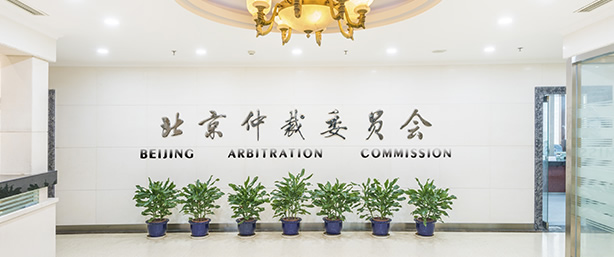
Wang Hongsong, Secretary-General of the Beijing Arbitration Commission
Dear leaders, fellow arbitrators and friends,
On behalf of the commission, I would like to report to you our work during the last year. The report mainly concerns the following six aspects:
I. Caseload

1. The commission accepted 1,830 cases in 2009, 227 cases, or 11 percent less than in 2008. In the meantime, 1,981 cases were concluded, 35 cases, or 1.7 percent less than in 2008. The conclusion rate in 2009 was 108 percent.
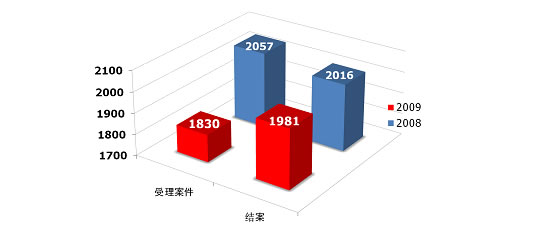
The decrease in caseload was mainly because the number of group cases continued to drop. For example, the number of group cases involving a few of the parties dropped by 356 in 2009.
2. The disputed amount totaled 8.8 billion yuan in 2009, 100 million yuan, or 1 percent higher than in 2008.
In 2009, the number of cases accepted by the commission ranked sixth and the disputed amount ranked second among all the arbitration institutions in China.
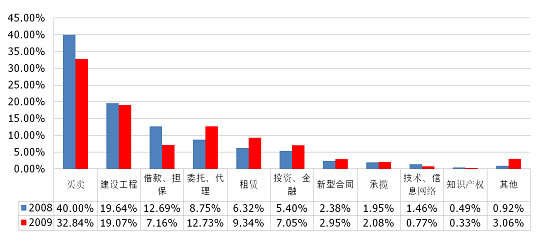
3. Among the cases accepted in 2009, sales disputes accounted for 32.84 percent, construction project disputes 19.07 percent, entrustment and agency disputes 12.73 percent, lease disputes 9.34 percent, loan and guarantee contract disputes 7.16 percent, investment and financing disputes 7.05 percent, disputes over new types of contracts 2.95 percent, contractors contract disputes 2.08 percent, technology and information network contract disputes 0.77 percent, intellectual property contract disputes 0.33 percent, and other types of disputes 3.06 percent.

The proportion of sales dispute cases decreased from 39.96 percent to 32.84 percent, and the number of cases decreased by 221; the proportion of loan and guarantee dispute cases decreased from 12.49 percent to 7.16 percent, and the number of cases decreased from 257 to 131; the proportion of entrustment and agency dispute cases increased from 8.75 percent to 12.73 percent, and the number of cases increased by 53, of which property management and service contract disputes increased rapidly; the proportion of lease contract dispute cases increased from 6.32 percent to 9.34 percent, and the number of cases increased by 41.
4. In 2009, 543 cases involved one or two parties from outside Beijing, accounting for about 30 percent of all cases, which was 113 cases, or 26 percent higher than in 2008. Of these cases, 83 involved two parties from outside Beijing, 26 cases, or 45.6 percent higher than in 2008.
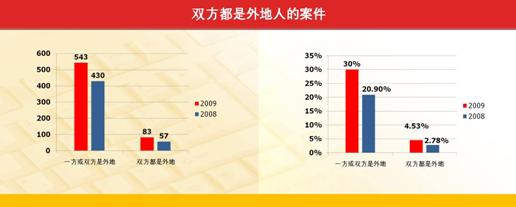
In 2009, 72 cases involved parties from outside China, which was 16 cases, or 28.57 percent higher than in 2008.
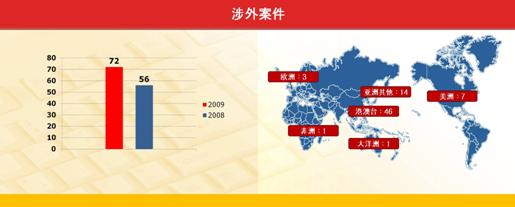
5. In 2009, the commission accepted one international commercial mediation case, in which both parties adopted cooperative mediation by employing two mediators from China and abroad. The case is now in process.
6. In 2009, the average duration of a case from constitution of tribunal to conclusion was 65 days, one day longer than in 2008.
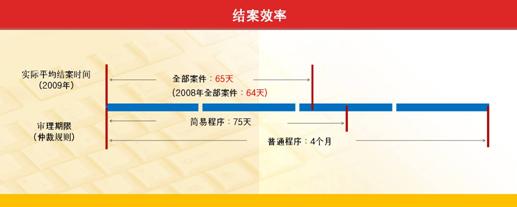
Among all the cases concluded in 2009, 1,105 cases were concluded with arbitration awards, accounting for 56 percent of the total, which was 238 cases, or 11.6 percent lower than in 2008; 272 cases were concluded by mediation, accounting for 13.7 percent of the total, which was 39 cases, or 17.7 percent higher than in 2008; 518 cases were withdrawn by the parties for reconciliation, accounting for 26.1 percent of the total, which was 133 cases, or 34.5 percent higher than in 2008; 86 cases were withdrawn by the parties for other reasons, accounting for 4.34 percent of the total, which was 12 cases, or 23 percent higher than in 2008.
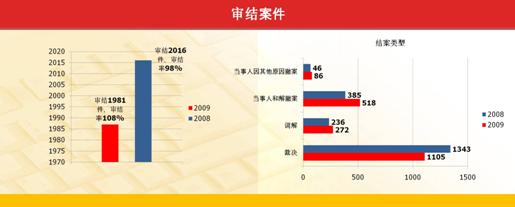
In 2009, 10 cases were revoked by the court, eight cases were re-arbitrated and seven cases were not enforced. The number of these cases totaled 25.
More cases were revoked, re-arbitrated or refused enforcement by the court this year than any other year in the history of the BAC. Some cases were revoked not because the arbitration tribunal was at fault, but for reasons beyond law and facts; some revoked or re-arbitrated cases were accidentally involved in other cases. In addition, the number of revoked or refused cases still accounted for a small percentage of total concluded cases. We have made continuous progress and satisfying achievements and the reputation of the BAC is growing We can find more reasons to comfort ourselves.
However, we still feel extremely bitter and heavy-hearted. Because we make it our sacred mission to realize fairness and justice; because we have made it our goal to establish a top international arbitration institution and provide top arbitration service to parties from home and abroad; because we sincerely hope the BAC can achieve sustainable development and become a base and platform on which to practice our ideals and serve society; because we are clearly aware that trust of the parties is the root of development for arbitration. Compared with positive assessments and praise, we should pay more attention to suggestions and criticism. We should remain vigilant against our defects and never be neglectful or slack off. Under the circumstances of social transformation and intensifying social conflicts, we should often examine ourselves, find problems and improve in time, so that we can improve ourselves fast enough to keep up with societys growing demand for arbitration services. In 2010, we will strengthen investigation and research in this regard, listen to opinions from different quarters and improve on aspects such as recruitment and appointment of arbitrators, nurturing of sole arbitrators, professional ethics improvement and occupational training of arbitrators, and perfection of the assignment management mechanism. We also hope that arbitrators can contribute their suggestions in these areas and improve their own work through the cases they are handling.
By the end of 2009, the BAC had accepted a total of 15,904 cases and concluded 15,156 cases, with a conclusion rate of 95.2 percent. Incomplete statistics showed that among all the concluded cases, 58 cases were revoked or partly revoked by the peoples court, 29 cases were decided by the court for re-arbitration and 32 cases were not enforced, with the number of these cases accounting for about 8 percent of total concluded cases.
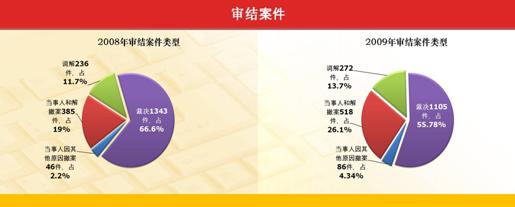
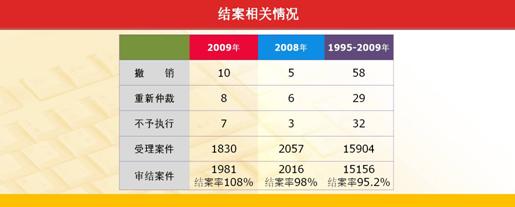
II. Performance
1. In 2009, the BAC generated revenue of 67.89 million yuan, of which revenue from arbitration was 62.97 million yuan, while rent revenue and other revenue stood at 4.92 million yuan. During the year, the BAC also paid taxes of 14.51 million yuan, up 2.47 million yuan, or 20.5 percent year on year. By the end of 2009, the BAC had paid cumulative taxes of 84.04 million yuan, 19 times the fiscal allocation by the government when it was initially established.

2. In 2009, the BAC had a working staff of 33 persons. There were three administrative assistants, the same as in 2008. The number of secretaries was 23. On average, each secretary concluded 86 cases in 2009. The accounting division handled nearly 20,000 financial documents, paid out awards 2,342 times, made 3,417 online bill declarations and issued 283 tax payment receipts. The working staff also assumed responsibility for publicity, training, theoretical research, convention organization, international communications, website construction, computer management, software development and other work.
III. Formulation of Rules and Measures
1. On January 20, 2009, the BAC, with the aim of solving construction disputes in an efficient and economical way, formulated the Construction Dispute Board Rules of the Beijing Arbitration Commission and the charging rules in accordance with the Trial Provisions on Standard Construction Tender Qualification Pre-Examination Documents and Standard Construction Tender Documents jointly released by the National Development and Reform Commission, the Ministry of Housing and Urban-Rural Construction, the Ministry of Industry and Information Technology and six other ministries and commissions. The rules offer parties guidelines for choosing the dispute board to solve construction disputes. Formulation of these rules was a bold attempt by the BAC to introduce alternative dispute settlement mechanisms and of positive significance to the sound development of the construction industry.
2. The Discipline Committee formulated, with the aim of perfecting the governance structure of the commission and strengthening the arbitrator supervision system, the Draft Working Rules of the Discipline Committee (hereinafter referred to as the draft), which will be submitted to the Committee of the Beijing Arbitration Commission for deliberation. The draft embodies the democratic and autonomous spirit of the commission, defines the responsibilities and working procedures of the discipline committee in administering qualifying exams to newly recruited arbitrators and investigating breaches of discipline by arbitrators, provides the necessary qualifications for discipline committee members and lays out the operating rules of the discipline committee. It strengthens the supervision and management of arbitrators by the discipline committee and improves the standards and transparent operation of the discipline committee itself. In 2009, the discipline committee held two sessions, examining the qualifications of newly recruited arbitrators and investigating some arbitrators suspected of breaching the disciplinary code.
IV. Publicity and International Communications
1. In 2009, the BAC had the most frequent international communications, the most arbitrators participating in international communications and the best effects. The Development Committee played an active role in these activities. In 2009, the BAC organized visits to and took part in nine international and regional conventions Major activities include:
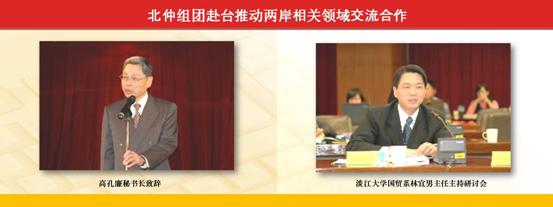
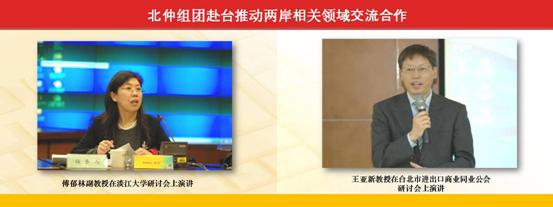
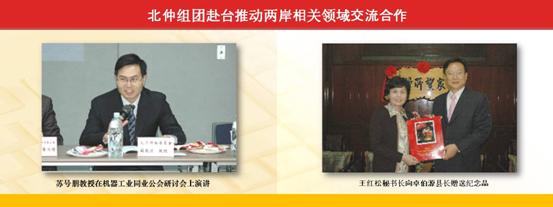
(2) On June 21-23, 2009, we took part in the Asia Pacific Regional Arbitration Group (APRAG) Conference 2009 held in Seoul, South Korea, and delivered a keynote speech titled Arbitration in China, deeply impressing the participants. BAC Secretary-General Wang Hongsong was again elected Vice Chairman of the APRAG
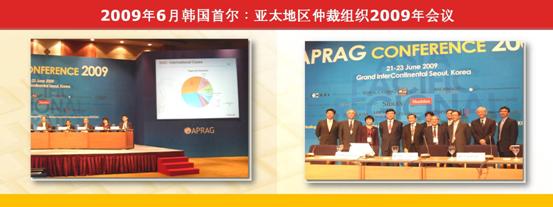
(3) On August 28, 2009, the BAC visited Taiwan and took part in the Third Seminar of the Grand China Arbitration Forum organized by the Chinese Arbitration Association, Taipei with the participation of nearly 100 representatives of dozens of arbitration institutions from the Chinese mainland, Taiwan, Hong Kong and Macao. The commission communicated with the representatives on alternative dispute settlement mechanisms and appointing arbitrators. Major Taiwan media reported on this forum.
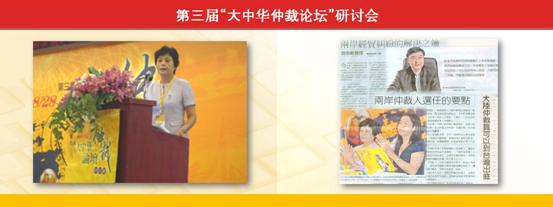
(4) On September 16-23, 2009, arbitrator Zhao Hang, a BAC representative, visited Germany for a seminar and ceremony held by the Chinese European Arbitration Center, the China Day event held by the Clifford Chance Law Firm of Germany, as well as the Third Dusseldorf International Arbitration School. Zhao introduced information on the BAC to an audience of more than 300 people from German business, legal and academic circles.
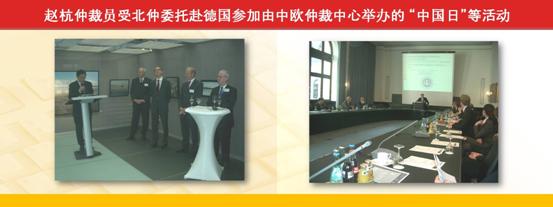
(5) On September 21-28, 2009, the BAC visited the United States for the advisory body meeting of the Pepperdine School of Law's Straus Institute for Dispute Resolution, and promoted Chinese commercial arbitration at the University of San Francisco School of Law, UC Berkeley School of Law and the Bar Association of San Francisco. The BAC also reached agreements of intent with the Pepperdine School of Law's Straus Institute for Dispute Resolution and the Berkeley Center for Law, Business and the Economy on dispute resolution training, apprenticeships and study opportunities for foreign students in the BAC.

(6) On October 29, 2009, the BAC attended a fall meeting organized by the American Bar Association Section of International Law, where a representative delivered a speech on the BACs measures to guard arbitrators just awards. Robert R. Davidson, executive director of arbitration at Judicial Arbitration and Mediation Services, Inc. (JAMS), highly praised the speech and hoped that the BAC could discuss its experience at the JAMS national mediation meeting in the future.
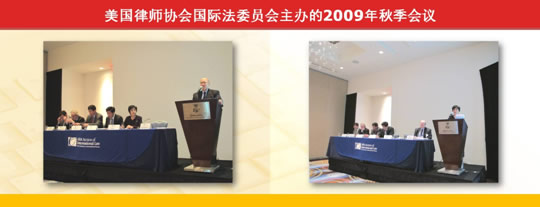
2. In 2009, we jointly held four conventions and seminars with universities, bar associations and industrial associations and received more than 10 visits by universities, dispute resolution institutions and law firms from foreign countries. Important events include:
(1) On March 16-19, 2009, the Master of Science in Organization Development program at Pepperdines Graziadio School of Business and Management conducted a case study on the governance structure of arbitration organizations. MSOD had previously distributed questionnaires and completed telephone surveys with several world-famous arbitration and mediation organizations on their organization structure and operating mechanisms. They had also talked with staff members and arbitrators at the BAC. After comparison and analysis, they put forward suggestions for perfecting the organization structure of the BAC. This is the fourth consecutive year that the MSOD program has conducted a case study on the BAC. The program thinks that the BAC has a clear target and perspective, and is able to implement this target over the long term. Through reform, innovation, making use of the strong points of all others, and actively assuming social responsibilities, the BAC has achieved huge success in a short time and wielded far-reaching influence on society. As a successful model, the BAC offers experience for research and promotion.

(2) On March 8, 2009, the BAC, the Securities Law Association of the China Law Society, Legal Daily and the Law School of Central University of Finance and Economics jointly held Risk Control and System Construction of the Securities Market Under the Financial Crisis---Symposium of NPC Deputies, CPPCC Members and Legal Experts. Nearly 100 NPC deputies, CPPCC members, and legal and securities experts discussed the focus and hot points of the securities market against the backdrop of the financial crisis. Legal Daily ran a feature report on this event.
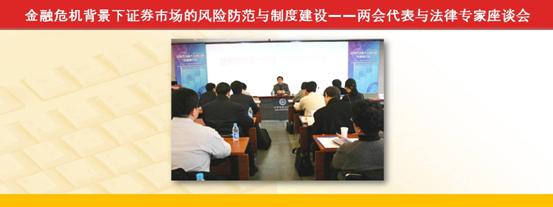
(3) On July 30, 2009, the BAC, the Beijing Branch of the New York State Bar Association and the Arbitration Committee of the Beijing Lawyers Association jointly held a cocktail party at the BAC International Convention Hall, discussing development of the BAC in international commercial arbitration in recent years. Officials from the Beijing Lawyers Association and the New York State Bar Association delivered speeches, and nearly 100 participants from international law firms, multinational companies, famous Chinese law firms and big companies attended the party.

On September 14, 2009, the BAC and the Chinese European Arbitration Center jointly held a seminar called Practical Aspects of IP Arbitration. Professional IP lawyers from France, Germany and Spain delivered speeches and discussed real cases.
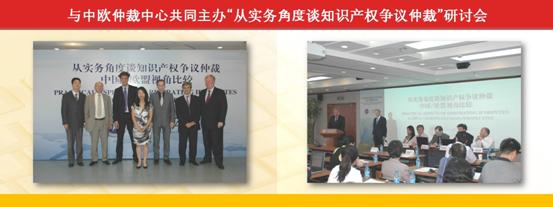
(4) On July 31, 2009, some BAC arbitrators took part in a mediation seminar held by the Chinese Arbitration Association, Taipei via remote video conference.
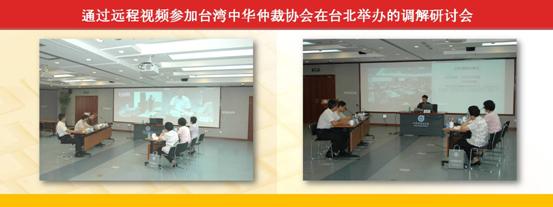
On December 17, 2009, the BAC and the Taiwan Private Equity and Venture Capital Association jointly held a seminar on private equity investment and legal risk control. Experts from both sides of the Straits analyzed the present situation, problems and solutions for private equity investment. Nearly 100 people from the securities industry, legal circles and universities attended the seminar.
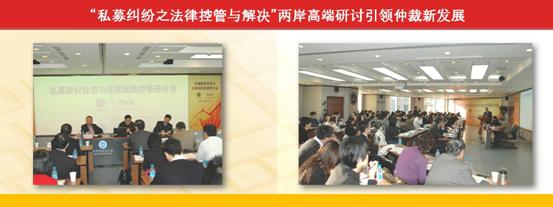
(5) In 2009, we offered professional trainings on professional ethics and arbitration procedures at arbitrator training meetings organized by the arbitration commissions of Mianyang, Zibo and Zhengzhou.
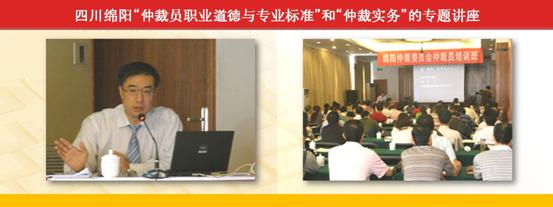
The BAC also provided lectures on topics in international financial dispute resolution and law application, arbitration and legal talent as well as arbitration theories and practice at the State Development Bank, Central University of Finance and Economics, and the Beijing Lawyers Association, with the participation of more than 1,500 people.
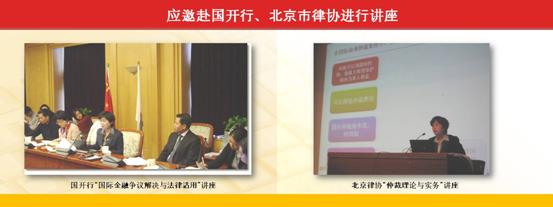
(6) In 2009, we also received more than 10 visits by the LLM foreign masters program at Tsinghua University, Northeastern University in the United States as well as chambers of commerce, dispute resolution institutions and law firms from the United States, Britain, Germany and Italy. We also gave apprenticeships to six law school students from UC Berkeley, New York University, Pepperdine University and UC Hastings College of the Law. By now the BAC has accepted 18 apprentices from the United States, Australia, Italy, Russia and Moldova, who have played an active role in publicizing Chinas arbitration system.
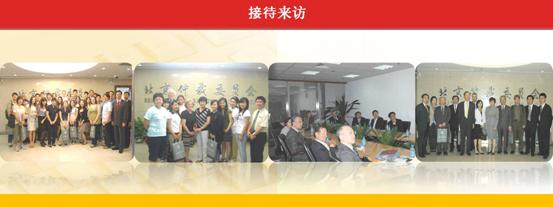
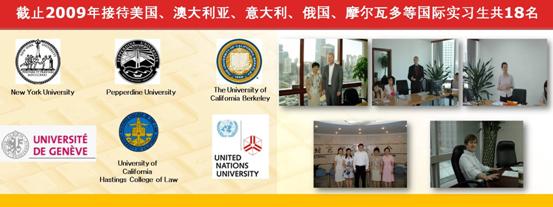
(7) On January 17, 2009, reconstruction of Yuguan Village Primary School in Mianyang, Sichuan Province, which was funded by the BAC, was completed and passed inspection. This is the earliest recovered hope primary school after the earthquake on May 12, 2008. On June 15 some arbitrators and members of the working staff visited Mianyang for the handover ceremony of the new building of the primary school. They also presented schoolbags and stationery on behalf of the BAC.
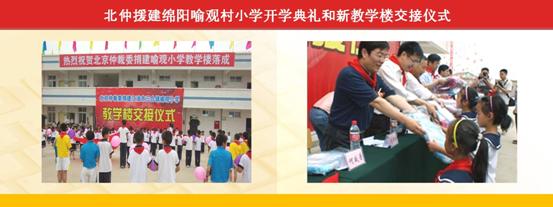
In May 2009, the BAC sponsored the Sixth New Academic Talent Award of the China University of Political Science and Law and attended the awards ceremony.
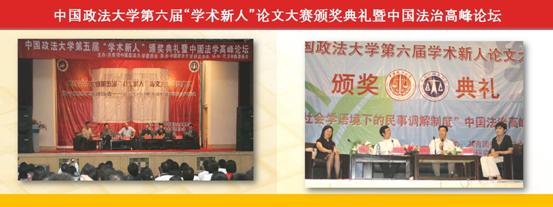
3. In 2009, 12 articles were published in domestic newspapers and magazines on the BAC and its alternative dispute resolution mechanism. Three issues of Beijing Arbitration (No.67-70) were published with a total of 350,000 characters. Eight electronic issues of the BAC newsletter in both Chinese and English were published with a total of 100,000 characters and words. The newsletter had 10,910 browsers, expanding the influence of the BAC. Particularly, famous Chinese legal periodical CASS Journal of Law published a research paper based on statistics collected by a national survey of the BAC in 2006 and 2007, so that the situation and problems of Chinese arbitration has attracted wide attention from legal circles. The major international arbitration periodical American Review of International Arbitration also published a long case study on the BAC, which deeply analyzed the independence, competence and justice of Chinese arbitration institutions and increased the understanding and trust of major Chinese arbitration institutions, represented by the BAC, among the international arbitration community.

In 2009, we further enriched our website in Chinese, adding basic materials including the revised BAC rules, the code of arbitrators and constitutions as well as our working reports. We posted 50 articles, 138 news items and 319 pictures. We also revised the layout of our websites in English, Korean and Japanese. Nine English-language news articles were released, and the number of visitors reached 441,132, surging 42 percent over 2008 (295,106 visitors).


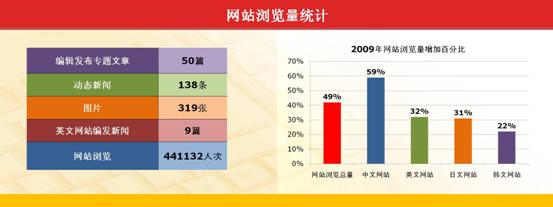
In 2009, we distributed more than 3,000 copies of the BAC Practical Legal Service System---Construction Projects and Real Estate Database to real estate developers, construction companies, law firms and industrial associations. With high practical value, the database has been welcomed by companies, law firms and teaching and research institutions. In 2010, we will update the database by cooperating with Beijing Lawyee Science and Technology Co. Ltd. The BAC also developed a compact disk of the BAC Practical Legal Service System---Securities and Futures Legal Practice by cooperating with the Chinese Securities Regulatory Commission. The disk, collecting 2,641 laws and regulations, 98 model contracts and 761 judgments and verdicts in the securities and futures field, will play an important role in regulating the securities market and promoting the application of arbitration in the securities and futures field.
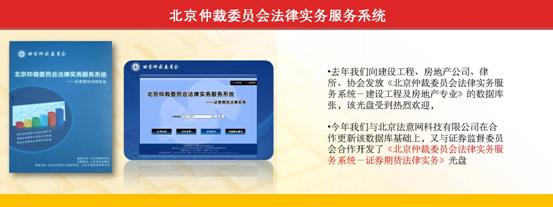
V. Training and Theoretical Research
1. Based on further improving trainings for arbitrators, the BAC is actively carrying out professional trainings on mediation, dispute resolution and lawyer practice and tries to make the trainings systematic, professional and practical. These trainings have enhanced the arbitration and mediation skills of arbitrators and promoted the popularity of arbitration, mediation and the dispute board. The trainings include:
(1) In April and November 2009, the BAC assisted Tsinghua Law School in holding two training sessions for arbitrators. Based on feedback from previous trainees, we improved the training courses and increased the content of arbitration procedures and mock arbitration. With the participation and commenting of experienced arbitrators and secretaries in the mock arbitration, trainees were able to better understand arbitration procedures and improve their real practice. Altogether 110 arbitrators took part in the trainings and examinations. So far nine training sessions have been organized by Tsinghua Law School with the participation of 462 trainees, of which 128 are arbitrators. Trainees in 2009 also included professionals from Hong Kong and Taiwan. At present, most of the newly recruited arbitrators at the BAC have completed the training and passed the examination.
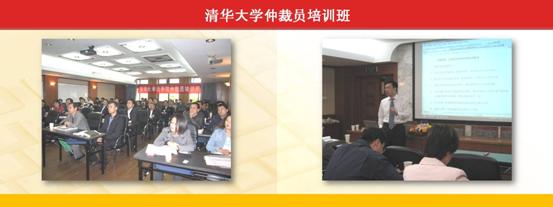
(2) In May, June and August 2009, with the aim of helping arbitrators enrich their knowledge and experience of international commercial arbitration, we invited experienced international arbitrators Philip Yang and Teresa Cheng to give weekend lectures on British arbitration law, Anglo-American contract law and evidence law every month. Altogether 110 people, including arbitrators, lawyers and people in charge of legal affairs at big state-owned enterprises, attended the lectures and 86 of them passed the examination and received certificates.

(3) On November 6-11, 2009, with the aim of promoting the implementation of construction project dispute review, the BAC held a three-day training course for construction project dispute reviewers. Altogether 104 people from the construction and legal fields in Beijing, Shanghai, Guangdong, Shanxi, Henan, Shandong, Chongqing and Taiwan took part in the training. A questionnaire after the training showed that the trainees were satisfied with the content and lecturers of the training as well as the BACs foresight and social responsibility in organizing the training.
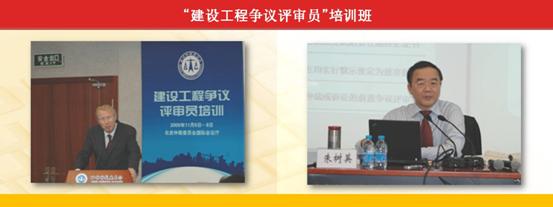
(4) Since October 2009, the BAC, the Beijing Lawyers Association and the School of Continuing Education at the China University of Political Science and Law have jointly held mock arbitration training for new lawyers. The mock arbitration is held monthly, with BAC arbitrators and senior lawyers acting as arbitrators and commentators with the assistance of the BAC, while new lawyers act as the parties and agents. The training is held at the BAC International Convention Hall. Three training sessions were held on October 30, 2009, December 4, 2009 and January 8, 2010, with the participation of 12 volunteer arbitrators and 520 new lawyers being trained. The training has been warmly welcomed by the trainees and achieved good effect. Training new lawyers is an innovative act in cooperative training by the BAC, which has far-reaching influence in promoting arbitration, improving the quality of agents in arbitration and creating a sound legal environment. We hope that more volunteer arbitrators can join us and make it better.

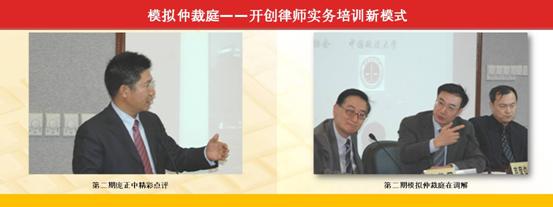
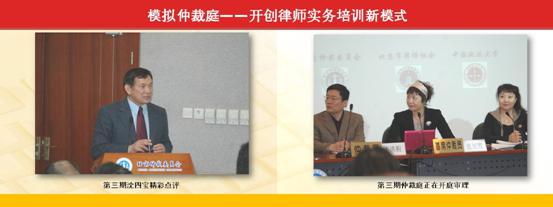
(5) In 2009 we held nine sessions of the arbitrators salon on management of arbitration procedures, communications in arbitration work, enforcement of arbitration awards, debates on contract law issues, etc., with the participation of 874 arbitrators and other professionals.
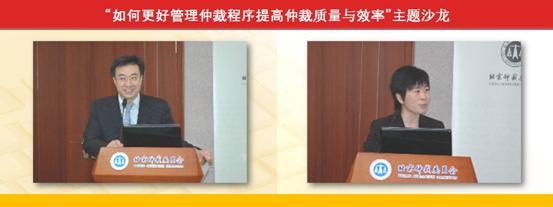
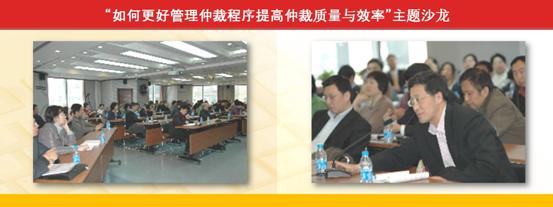
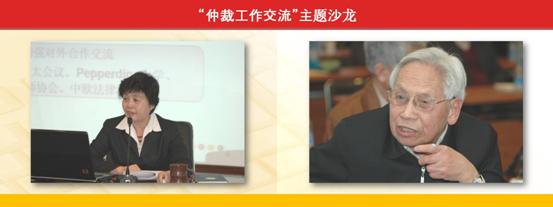
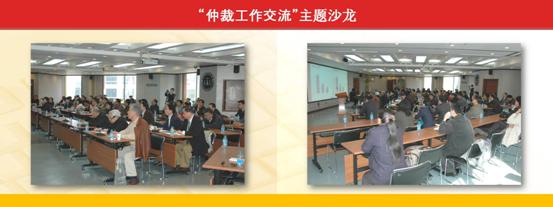
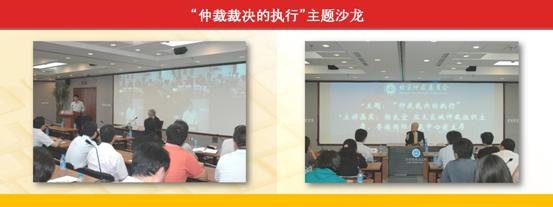
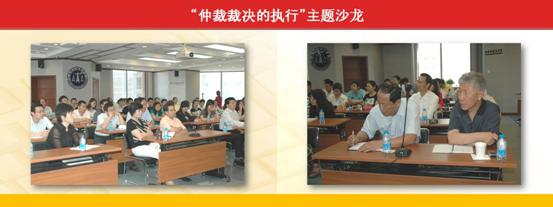
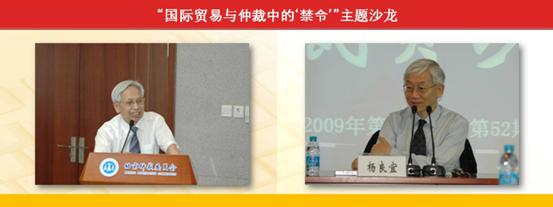
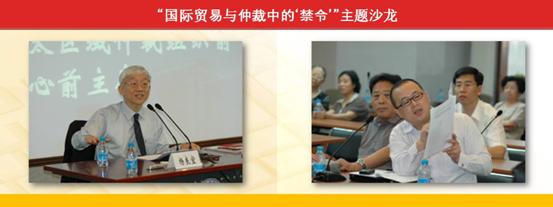
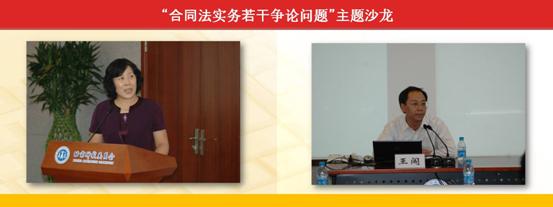
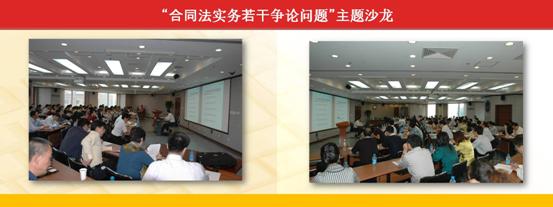
2. Theoretical research in 2009 includes:
(1) In August 2009, by cooperating with the China University of Political Science and Law, we carried out a research project called 2006-08 Case Analysis of Arbitration Judicial Review by Beijing Courts. Working staff of the BAC guided students from the university to input all the revoked arbitration cases from 2006 to 2008 into computers and conduct a systematic analysis using SPSS software. The students completed a report of more than 10,000 characters that was significant in promoting arbitrators understanding of judicial review of arbitration awards and the real situation of judicial review and improving the quality of arbitration.
(2) On August 12, 2009, Zhu Jiang, Vice President of the Higher Peoples Court of Beijing, as well as presiding judges and senior judges from higher and intermediate Beijing courts, visited the BAC for investigation, discussing with staff how to promote the development of an alternative dispute resolution system. We discussed the development of the BAC and staged the results of a case study of judicial review, drawing keen interest from the judges.
(3) In July and September 2009, some arbitrators and working staff of the BAC made open and sincere communications with officials and senior judges of the Second Intermediate Peoples Court of Beijing on the effect of arbitration contracts and judicial review standards for arbitration awards. We have reached consensus on some issues.
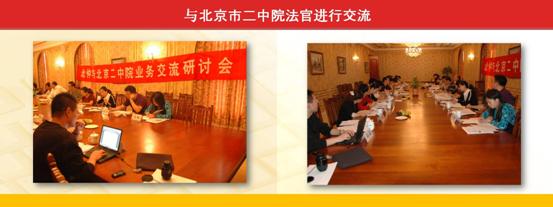
(4) In 2009, the BAC continued the alternative dispute resolution mechanism program of the Supreme Peoples Court and jointly established a column on exploration of alternative dispute resolution mechanisms in cooperation with Peoples Court Daily and the Office of Judicial Reform of the Supreme Peoples Court so as to promote improvement of the judicial environment for arbitration. Entrusted by the National Development and Reform Commission and the Ministry of Housing and Urban-Rural Construction, some BAC arbitrators participated in the drafting of the standard text for the Concise Designing-Construction Contract and the Administration Regulations of the Construction Market. The drafts have now been submitted to the related departments and are praised by government officials. In addition, we have assisted arbitration-related programs at the Hong Kong University of Science and Technology, the East China University of Political Science and Law, and others.
VI. Software Development and Office Development
1. Since 2008, the BAC had been developing the arbitrator online office system by cooperating with a computer company, and the system was put into use on August 1, 2009. The system was developed in order to strengthen communications and interaction between arbitrators and between arbitrators and secretaries, saving money and increasing the quality and efficiency of case settlement. Using this system, arbitrators can view information regarding their cases in process, cases concluded, remuneration of cases and revoked cases or awards not enforced. The system also provides an electronic calendar for arbitrators, recording the dates for arbitrators to attend trials, salons and meetings; the schedules can be readjusted as time passes. The calendar is like a secretary constantly accompanying the arbitrators and can help them remember the time of trials and various events. The Arbitrators Online Office System is another information technology management system developed by the BAC after the arbitration case management system, arbitration enquiry system and arbitration working staff online office. The biggest advantage of this system is that it connects arbitrators and the working staff, integrates resources, promotes experience exchange and knowledge sharing and increases the efficiency of information transmission. It promotes innovation in management ideas and technologies: It enables us to transfer the work finished with intuition in the past to a systematic working style, sum up the experience into principles and concepts and replace a contingent understanding of things with a more logical and coordinated way of thinking. So far 202 arbitrators have logged on and used this system, including 23 arbitrators from foreign countries, four arbitrators from Hong Kong and one arbitrator from Taiwan.
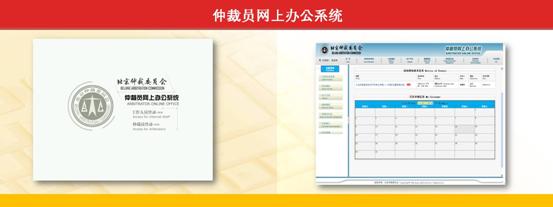

2. In 2009, the office recruited two secretaries for case filing and one secretary so that the work of case filing and handling could progress smoothly.
3. To further improve the service quality and efficiency of secretaries and perfect the internal incentive mechanism and restraint mechanism, the office, after years of investigation and analysis, formulated and tried out a secretary performance rating mechanism in 2009, which has increased the service quality and efficiency of secretaries.
4. To encourage secretaries to improve their professional quality, the office sets store in nurturing secretaries and encourages them to actively participate in theoretical research. In 2009, secretaries published many research papers and some works of significant theoretical and practical value.
The above are the major contents of our work in 2009, which, in fact, cannot be fully included in my speech. Since its establishment, the BAC has been growing with the expectations of all its arbitrators, committee members, leaders of related departments and friends from various walks of life. Without your support, it would have been impossible for the BAC to achieve todays level of progress and development. Here, on behalf of all the members of the office, I express my heartfelt gratitude to all our leaders, arbitrators and friends!
Best wishes to all of you!